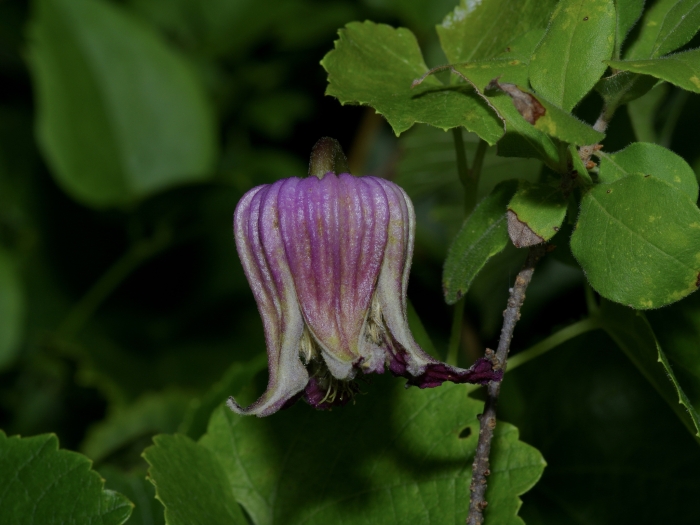Purple Leatherflower
(Clematis pitcheri)
Purple Leatherflower (Clematis pitcheri)
/
/

Michelle W.
CC BY 4.0
Image By:
Michelle W.
Recorded By:
Copyright:
CC BY 4.0
Copyright Notice:
Photo by: Michelle W. | License Type: CC BY 4.0 | License URL: http://creativecommons.org/licenses/by/4.0/ | Rights Holder: Michelle W. | Publisher: iNaturalist | Date Created: 2021-07-14T05:44-07:00 |



















































Estimated Native Range
Summary
Clematis pitcheri, commonly known as Purple Leatherflower or Bluebill, is a herbaceous, perennial vine native to prairies, open woodlands, and along stream banks in the south-central United States and northern Mexico. It typically climbs to heights of 3-9 feet (1-3 meters) using tendrils. The leaves of this species are variable, oppositely arranged along the stems, and can be simple or compound, with a rich green color. From late spring to early fall, it produces urn-shaped, purple to blue flowers that are quite showy and attract pollinators. The plant does not produce significant fruit or berries, but the flowers are the main ornamental feature.
Purple Leatherflower is valued for its unique flowers and vining habit, making it a good choice for trellises, arbors, and fences in gardens. It is relatively low-maintenance, tolerating a range of soil conditions, though it prefers well-drained soils. In cultivation, it thrives in full sun to part shade and requires medium amounts of water. While generally disease-resistant, it can occasionally suffer from Clematis wilt, a fungal disease that causes sudden wilting and death of stems. To prevent this, good air circulation and careful watering practices are recommended.CC BY-SA 4.0
Purple Leatherflower is valued for its unique flowers and vining habit, making it a good choice for trellises, arbors, and fences in gardens. It is relatively low-maintenance, tolerating a range of soil conditions, though it prefers well-drained soils. In cultivation, it thrives in full sun to part shade and requires medium amounts of water. While generally disease-resistant, it can occasionally suffer from Clematis wilt, a fungal disease that causes sudden wilting and death of stems. To prevent this, good air circulation and careful watering practices are recommended.CC BY-SA 4.0
Plant Description
- Plant Type: Vine
- Height: 4-10 feet
- Width: 2-3 feet
- Growth Rate: Moderate
- Flower Color: Pink, Purple
- Flowering Season: Spring, Summer
- Leaf Retention: Deciduous
Growth Requirements
- Sun: Full Sun, Part Shade
- Water: Medium
- Drainage: Medium
Common Uses
Bee Garden, Bird Garden, Butterfly Garden, Deer Resistant, Drought Tolerant, Hummingbird Garden, Potted Plant, Rabbit Resistant, Showy Flowers
Natural Habitat
Native to prairies, open woodlands, and along stream banks
Other Names
Common Names: Bellflower Clematis, Pitcher’s Clematis, Coloradoklematis
Scientific Names: , Clematis pitcheri, Clematis filifera, Clematis pitcheri var. filifera, Clematis filifera var. incisa, Coriflora pitcheri, Clematis pitcheri f. lasiostylis, Clematis coloradoensis, Clematis cordata subsp. pitcheri, Clematis pitcheri f. leiostylis
GBIF Accepted Name: Clematis pitcheri Torr. & A.Gray